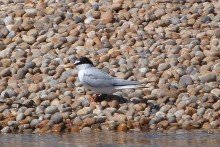Whilst ospreys are not the rarest bird to visit Dorset by any means they provided the main talking point for June this year; will they or won’t they nest in Dorset next year? Some time ago now the RSPB put up platforms on poles on their reserve at Arne to try and attract ospreys to nest there. It seemed an ideal site with an ample food supply at hand in Poole Harbour and ospreys often stop off here during migration for a while, especially in autumn when they leisurely make their way back south to Africa from their breeding grounds further north in Britain.
The excitement this year was started by the arrival of a young male osprey, just two years old and ringed as a chick in a nest by Rutland Water, who seemed to take up residence, feeding daily on fleshly caught mullet and spending a lot of time on the nesting pole. Being just two he was too young to start a family this year but may be he has an eye to the future? The anticipation increased when he was joined later in the month by a female. Not bearing a ring nothing is known about her but the two spent much of June together around Poole Harbour and one can only hope they agree to meet up here next spring and start a family!
One of Britain’s rarest breeding sea birds is the little tern and a colony of them can be found on the Chesil beach near Ferrybridge. The colony was in danger of dying out but now a 24-hour protection watch has been established by dedicated volunteers and there are signs the colony is now growing and prospering. After a successful season last year it was good to see over 40 nests established this year and lots of nesting activity taking place.
Dorset always seems to attract its fair share of rare birds and, although June is not always the best month, this June saw a number of notable species turn up. The arrival of an elegant tern, usually associated with the Pacific coast of the Americas, certainly set the local birders pulses racing. It had spent some time in at Pagham Harbout in Sussex before making a short stop over at the lagoon on Brownsea.
Other notable birds in June included a greenish warbler, a buff-breasted sandpiper, a couple of golden oriel, at least two red-footed falcons, a bee-eater, an alpine swift, a woodchat shrike, a little gull and a common rosefinch. The common rosefinch has spent quite a while on Portland and stayed into July.
Also on the ornithological front it is worth noting that the number of red kite sightings continues to increase raising hopes of potential nesting in the county next year.
The coming of summer saw the emergence of some of Dorset specialist butterfly species. Silver-studded blues and marsh fritillary seemed to be in good numbers and records for white admiral seemed to suggest they might be doing well this year. Lulworth skipper started to emerge towards the end of the month and the Essex skipper seems to be establishing itself in some areas too.
Damsels and dragons are popular with recorders and records for scarce chaser seemed to show that this once rare species is increasing in numbers along with the hairy dragonfly. Lesser emperor dragonflies now seem to be thriving at Longham Lakes, another notable species. The rare southern damselfly was also reported from a site on the Purbeck heaths.
Other significant insect records included sightings of the very rare Purbeck mason wasp and the mottled bee-fly. The flecked general soldier fly was another significant find.
Finally, the warming sea water brought several sightings of bottle-nosed dolphins as well as a couple of instances of harbour porpoises.
You can find out more about the nature of Dorset here: www.natureofdorset.co.uk
Peter Orchard







